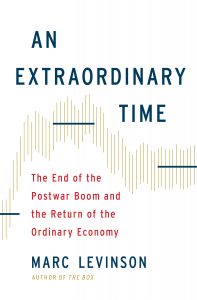My New Book
Donald Trump’s presidential candidacy was not remotely on my mind when I began writing my latest book. Nor do I claim to be a political scientist. But the perspective I offer in An Extraordinary Time, which was published on election day, may be useful in understanding the deep discontent that has manifested itself in Trump’s election, Brexit, the rise of fringe parties across Europe, and many other ways.

The book examines what I consider to be a turning point in the history of the second half of the twentieth century–the sudden change in the trajectory of economic growth across much of the world at the end of 1973. Until that point, people in all the advanced industrial economies, and in many of the less developed economies, had enjoyed a quarter-century of nearly uninterrupted prosperity. Living standards had improved in remarkable ways. At the start of this period, around 1948, millions of people in Europe, North America, and Japan still plowed farm fields behind horses or mules and lived in houses lacking electricity and indoor plumbing. Most adults never had a chance to finish high school, and employment usually meant unrelenting physical toil. By 1973, most families could afford cars, color televisions, and summer vacations, and an expanding welfare state provided unprecedented security in the event of on-the-job injury, widowhood, and old age. Unemployment rates were low, wage increases frequent. People could feel that their living conditions were getting better year by year, and they heard constantly that wise government stewardship of the economy made this advance possible.
All of this changed dramatically after 1973. Average incomes would grow less than half as fast through the end of the twentieth century as they did during the Golden Age between 1948 and 1973. As full employment vanished and wage gains slowed, the welfare state came to be seen as a burden, not just a boon. The economic experts who had touted their ability to deliver permanent prosperity had no effective way to fix the underlying problem: much slower growth of productivity. Voters turned right, to leaders such as Margaret Thatcher and Ronald Reagan, but it turned out that free-market policies such as firm rules for monetary policy, deregulation, and lower tax rates were no more successful at restoring robust economic growth than the statist policies they replaced.
The reality, I suggest, is that the supercharged growth of the Golden Age was an extraordinary event that cannot be repeated by government directive. My subtitle, The End of Postwar Boom and the Return of the Ordinary Economy, highlights the fact that at most times and places economies grow slowly, not explosively. Voters, recalling the post-war experience, expect more. Politicians have no way to deliver it. That is a recipe for discontent, of which Brexit and Trump’s election are only the latest examples.
Tags: history, productivity